Slipknot’s Shawn Crahan: ‘I know what real evil is… My past problems are minuscule now compared with the path my wife and I are on’
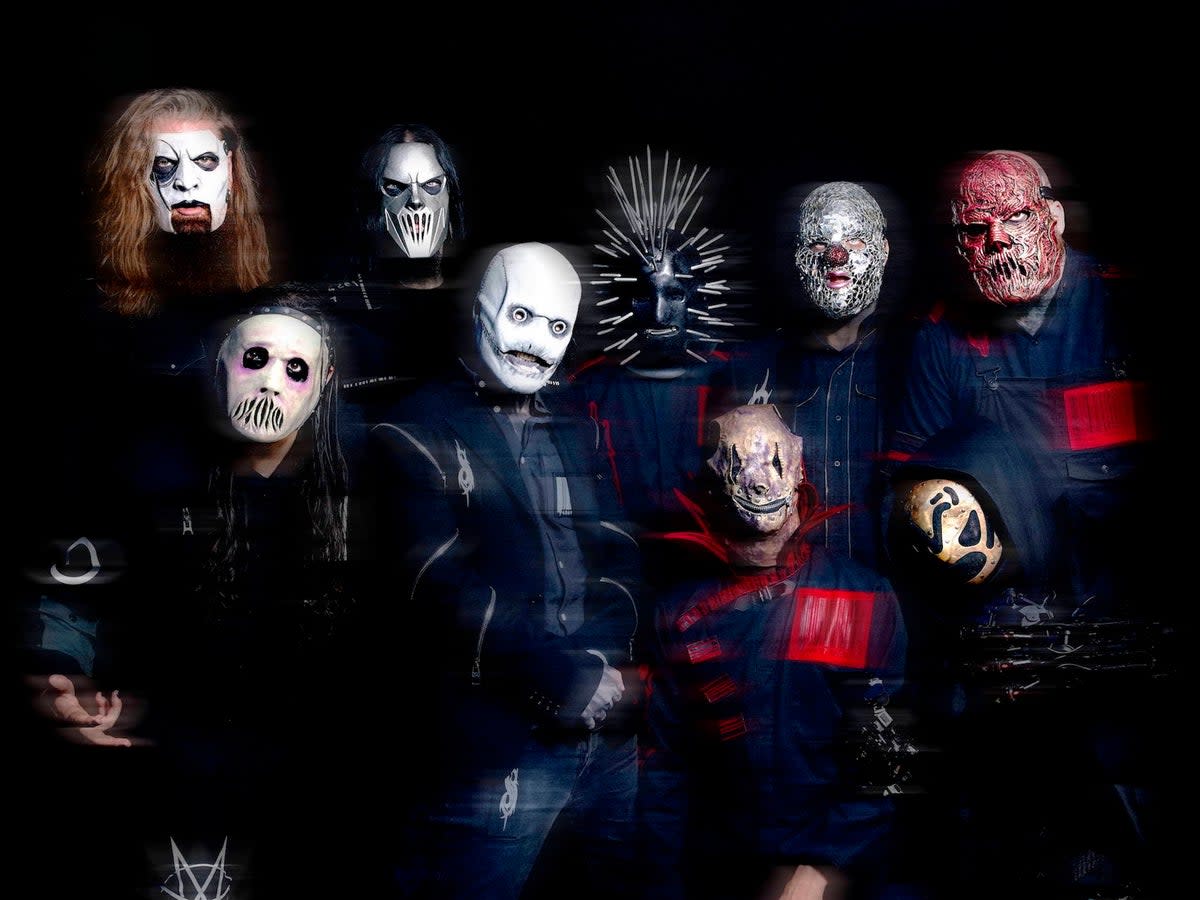
“That’s always a loaded question,” replies Shawn Crahan. As clown, percussionist and creative engine of Slipknot, Crahan is familiar with loaded questions. With their 1999 debut, the heavy metal band unexpectedly punctured the mainstream. Their skull-splitting sound and spine-chilling masks attracted fans en masse, intense scrutiny in tow. “My hardcore fans are gonna hate me for what I say.”
Slipknot are on the way to Nashville and Crahan is calling from his tour bus, which is currently churning along somewhere in Texas while he does some on-the-road promo for their new album The End So Far. “Well, not hate me, but they’re gonna be upset.” Regardless, Crahan confronts the question just as he has always done: head-on and without looking back. “I’m listening to a lot of Ariana Grande, some Christina Aguilera. I have a real love of pop.” There’s some jazz too. And five-hour long YouTube compilations of stoner metal bands he missed the first time around (“Gotta love the kids who make these things”).
Confessing to being an Arianator is not on the list of things you expect to hear from a 53-year-old man co-piloting a heavy metal band. The same man who huffed the fumes of a dead crow to psych himself up before a show. And whose furious antics at said shows have resulted in, among other injuries, a slipped vertebra and broken ribs. But in this way and infinite others, including a fervent love of post-impressionist artists such as Cézanne, Crahan embodies exactly what has always been true about Slipknot: there’s more to him than meets the eye.
For 27 years, Slipknot have offered their listeners annihilation. Tune in and your world falls to pieces, lost in a maelstrom of jagged riffs, warlike drums and growled vocals. It’s an all-out assault on your eardrums. The nine-piece outfit have always been a now-you-see-them/now-you-don’t kind of band, wherein they’ll release a record, go dark and then return with another four to five years later. Even metalheads need self-care. “I try to take a deep breath and repair my body, my mind and my spirit,” says Crahan. Taking a break also fosters anticipation – for the fans and the band themselves. “When you’re gone for a while and you come back, you get some of those feelings from the early days. It can make you feel needed and wanted. As a musician you can be very insecure with your art and then, when the business is hounding you because the album is coming out, you get more insecure. I’m pretty known for disappearing right as an album begins rolling out.”
It’s unlikely then that Crahan would give an interview days before The End So Far drops – but here he is, doing just that. We only get a few minutes of face time before bad wifi on the road forces our video call onto the phone. But in that time, I see a face that’s mostly beard. An impressive wild brush of hair that balances out a slick swoop of grey up top. You might say the creases on his forehead have sharpened over time but, in truth, the ridges might have existed since he was a newborn babe for all we know. Photographs of a young, maskless Crahan are few and far between.
Slipknot have sold more than 30 million records since 1999. Their self-titled breakthrough was the fastest-selling metal debut in history and has since been certified double-platinum. The dark and twisted 2001 follow-up Iowa was the first metal album to score number one in the UK. Some two decades and four albums later, 2019’s We Are Not Your Kind arrived to critical acclaim. It earned the band their second UK number one. The Iowan behemoths blocked Ed Sheeran from a fifth week in the top spot. These accolades are staggering. Even more so when you consider it was all achieved without compromise; donning grotesque latex masks and all. Slipknot don’t exactly scream broad appeal.
Here they are, against all odds, on the cusp of their seventh record and still playing world tours. Still, Crahan wants more for Slipknot – and he doesn’t understand why they can’t have it. “I don’t necessarily want to be a big pop artist, but Slipknot at this point is pop culture, so for me I want to stand right next to those people because they need to know what is happening on this side of art,” he says. Despite their relative success with the masses, Slipknot – and heavy metal as a genre – remain on the fringes of mainstream. “Maybe it’s my big mouth. Maybe it’s my attitude – which I’ve changed and, if they were paying attention, they would notice that – who knows what it is? Maybe we just look and feel like we’ll ruin the party,” he shrugs. Crahan says it’s “ironic” hip-hop has found its way into pop, but metal appears doomed to stay the outsider forever. It’s funny, he says, because “I don’t think our subject matter is as extreme as some hip-hop subject matter. So, I’m always wondering, what’s the hiccup here?”
Marketing isn’t why Crahan got into music. Fatcats, bigwigs and boardrooms are the antithesis of the Slipknot ethos. Back in the day, he would smash clocks on stage. “It was my way of saying I am not on your time frame. You are not going to have a clock on stage telling me to work faster.” He spits the word “clock”, every consonant barbed with disdain. For Crahan, it has always been about the art. “I’m on this bus because of those two hours I’m on stage that I share with my community and that’s it.”
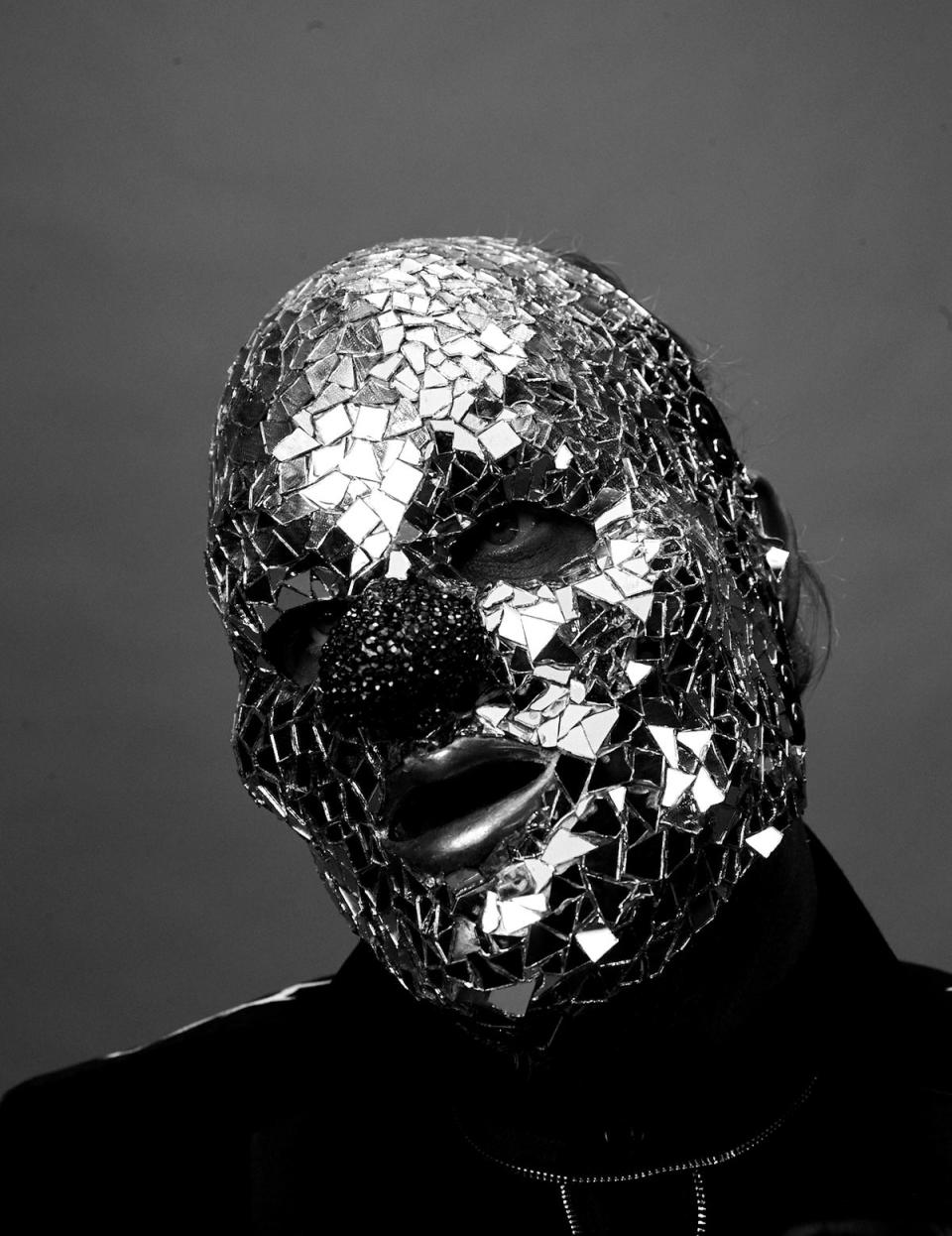
Re-signing with Roadrunner isn’t off the cards. “But the business has changed so much. The people there who helped break Slipknot haven’t been around for a very long time. I couldn’t tell you five people at the label now that I know personally,” he says. “Our success was because of so many people, and now they’re all gone.” Crahan is in no rush to decide. “Chances are I’m going to go elsewhere, but let’s remember something: I signed a record deal because the label said they were going to sell albums and they did so I can’t be mad at them for anything. But there’s a billion things I could do better for my family and for myself now that I’ve worked hard and completed my duty. I now have the ability and authority to challenge anybody who wants to work with Slipknot to take us seriously because we’re not just a little band any more. We’re a real band.” Whatever they do choose, Crahan declares, it’ll be what’s best for the group. “Slipknot was our dream. It’s our imagination. It has become our life. I’ve spent 25 years, almost half my life, on Slipknot.”
Like all members of Slipknot’s starting line-up, Crahan grew up in Des Moines. The 515 area code flashing on my phone suggests he remains the same down-home Iowa boy with dreams of starting a band in the mid-Nineties. Crahan’s childhood bedroom had bunk beds, despite the fact he was an only child. The problem was they kept breaking. “I’d be dead asleep on the top bunk and the mattress would fall down on the other mattress and then they’d both fall down on the floor,” he laughs. “That’s when I realised I could feel the fan better from down there. The fan took out all the noise of life, so I started sleeping on the floor.” In addition to the mattress and the fan were posters on the walls (Van Halen, Farah Fawcett, Iron Maiden, Pink Floyd) and a drum set in the corner.
Crahan attended private school, meaning his rock-and-roll education was hindered. Band shirts were forbidden. Walkmans were confiscated. He had also been wary of metal music because all the TV showed was hair metal stars like Poison and Bon Jovi. “They wouldn’t show real metal on MTV, so I was just naive. I didn’t know,” says Crahan. “And then I met Paul. Paul Gray.” Crahan met the late bassist of Slipknot through the local punk scene. “We lit s*** on fire, played in our underwear. Just dumb shit. That’s how we got to be friends. I loved Paul and he loved music, and he was able to show me a lot of what I didn’t know.” Through Gray, he was inducted into the world of death metal: Cannibal Corpse. Morbid Angel. Testament. Eventually, they brought in Gray’s former schoolmate Joey Jordison to play drums. “We were just kids more or less. Joey was a night manager at a gas station, and I’ve always had insomnia so I would drive down there and just laugh about the s*** we were gonna do in the world. We would come up with this crazy s***. Joey would come up with stuff because he knew I was crazy enough to do it and I would come up with stuff because I knew he was crazy enough to do it,” he recalls wistfully.
Losing a child isn’t something you get over. That’s all I can say. It changes you – and that’s it
But double platinum debut albums aren’t born out of laughs. “We had a work ethic. We began practising every day. Practice was at five and, if you weren’t there at four, you were late.” It was six days a week; six hours a day. “So that’s the story: a bunch of young kids in the middle of the Midwest; big dreams, big imagination. Wholly believing that we were never going to get it but willing to do anything to get it. And now that I have it, I’m so sure I want it.”
When Jordison died in May last year, Crahan became the only founding member of Slipknot still alive. Gray died when he was 38 in 2010 from a drug overdose. Jordison, who had already left the band in 2013, died last year aged 46. A cause of death wasn’t announced but the drummer had suffered from transverse myelitis, a neurological disorder. If not an albatross around Crahan’s neck, the title of “last surviving founder” certainly speaks to a difficult life. “It’s pretty heavy,” he says, retreating inward in search of the right words to verbalise his feeling. He finds them, as he often does, in a metaphor. “I wear certain shoes,” he begins. “Not only can you not wear these shoes, but you don’t want to wear them. You don’t even want to see the shoes. I try not to tell people about it because it sounds like I’m bitching, and I wouldn’t blame them for thinking that since I’m in Slipknot and get to do what I get to do; I am blessed. I am thankful. All I’m saying is I have some shoes that I have to wear that are not always very comfortable.”
In 2019, Crahan’s youngest daughter Gabrielle died at 22. He brings her up a few times in conversation. “I’m not trying to be morbid,” he says. It’s just that grief has taken him over. “I know what real evil is now. Anything I thought was evil, all my past problems are minuscule compared with the path that my wife and I are on. We’re all so locked to the clock and the dollar that we almost refuse to see those other paths that other human beings are walking. With me, I see the people on paths next to me. I don’t want you on my path. I don’t want to invite you over on this path. I don’t want to teach you about the path. Goddammit, I didn’t even know this path was here but I’m on it now.” He adds, “Losing a child isn’t something you get over. That’s all I can say. It changes you – and that’s it.”
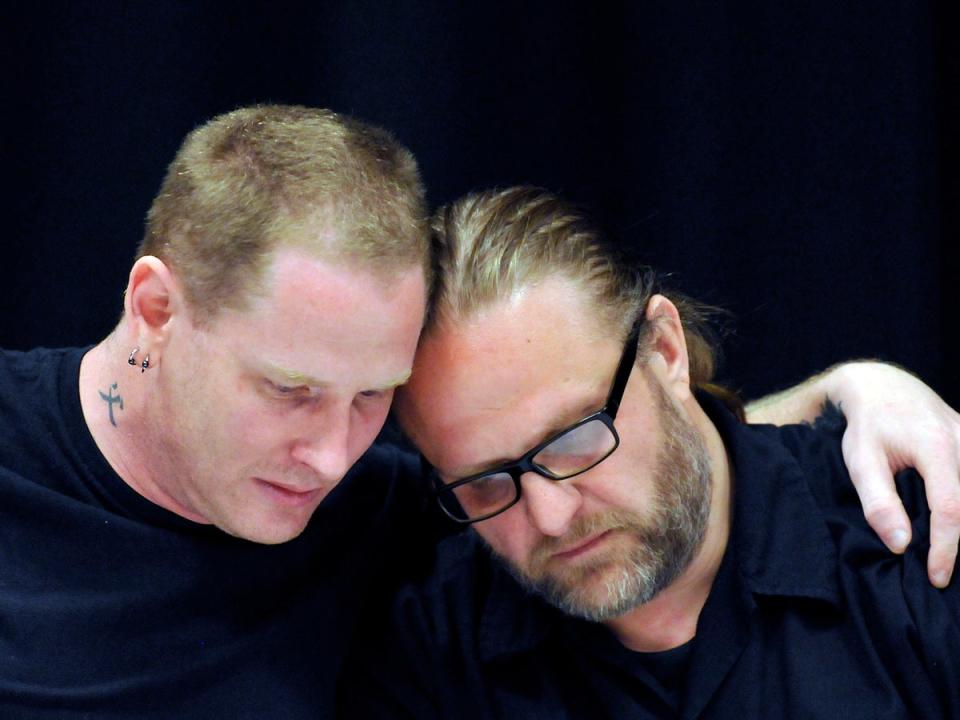
You can hear his loss on The End So Far. But only if you’re listening for it. “It’s there, but in ways I don’t know that anybody will even recognise unless they wake up and really pay attention,” he says. Listen closely and you’ll hear Crahan playing a drum set on the searching, space-agey album opener “Adderall” – something he doesn’t typically do for Slipknot; Crahan plays the toms, sometimes a bashed-up beer keg. The song itself is a curveball for the band. A downbeat alt-rock song with hints of jazz and melodic vocals from frontman Corey Taylor. “I want the song to speak to you when you hear it,” says Crahan. “You’ll feel it. What’s in there is someone with a lot of pain shovelling it out his leg and into a bass drum.”
It’s hard to imagine another genre quite as adept at exorcising demons as heavy metal. The punishing percussion and pummelling vocals scream catharsis at the best of times. Slipknot are never too far from trauma, and they’ve had to mourn through music before, more often than seems fair for any one band. Their seminal 2001 record Iowa begins with the howling cry of DJ Sid Wilson, who had just learned of his grandfather’s death. Nine years later and the contemplative .5 The Gray Chapter paid tribute to their late friend and bassist. We Are Not Your Kind was made in the aftermath of Taylor’s marriage break-up and a 2015 altercation in which long-serving guitarist Mick Thomson survived a stab wound to his head from his brother.
There are few albums as storied as Iowa. The recording sessions to produce that second album are fabled, permanently etched into metal music history. Taylor was doing vocal takes naked while cutting himself with glass and vomiting. Everyone was at each other’s throats. Drugs were ubiquitous. The album was a high point in the band’s career and a low point in its members’ lives. Crahan recalls the pressure on them to create another hit album following the world tour for Slipknot. “I wanted time. I wanted time for my family. I wanted time for my art. Half the band needed time and the other half is like, ‘Fuck you, we’re going back out there and living that lifestyle.’ Then you’ve got drugs and chemicals starting to show their faces. There’s a little bit of success so there are girls around. And everybody’s got a good idea; everybody wants to make you something. It was a dark time for all that. All the succubuses coming in, the drugs, the women,” he pauses and corrects himself. “Not that women are a problem. It’s just that when you need to manoeuvre through the women and the chemicals and the money and the success… there’s nobody helping you and everybody is just feeding your ego. It’s a disaster. It was a lot of partying. People could’ve died.”
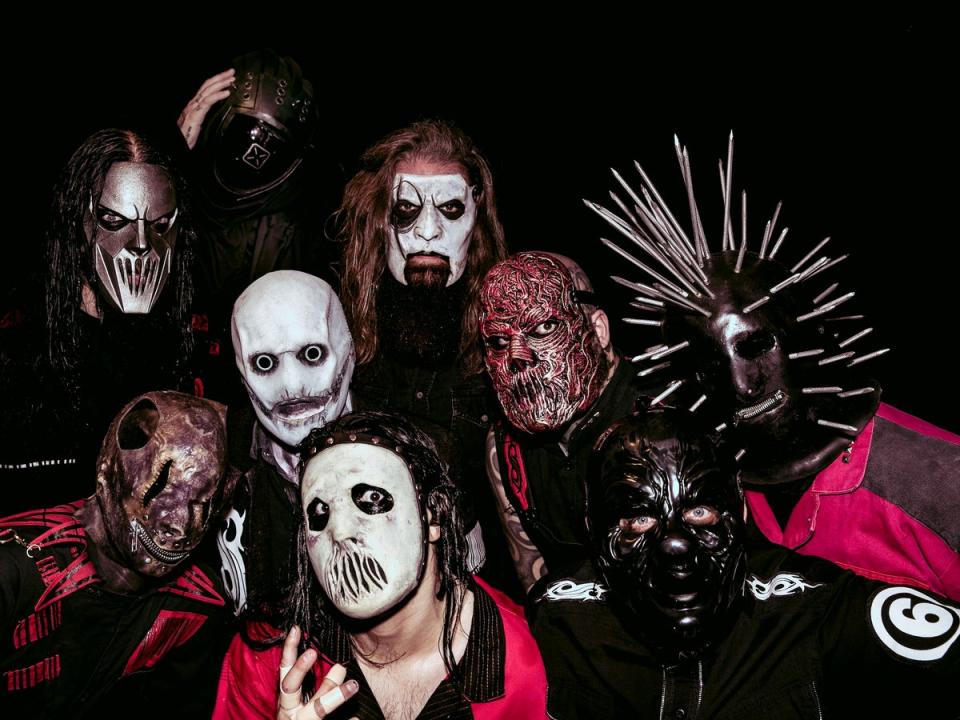
Above all else, Crahan is a fan of his fans. But in tumultuous times, Slipknot have had to pull away. “We had gone from inviting people backstage and having parties to, ‘I don’t want to see f***ing anybody.’ We’re locked down. I feel bad sometimes because I’m not that kind of rockstar, but I’ve been hurt by fans. I’ve had friends who have been killed by fans and, you know, it’s a different world. It was a dark time.”
Crahan is a loquacious speaker, often slipping into metaphors and similes. Hard to grasp at times but easy to get swept up in. He is passionate and earnest, and never more so than when he is speaking about Slipknot fans. The maggots. Lady Gaga has little monsters; Justin Bieber has Beliebers; Slipknot have maggots. Crahan came up with the name decades ago. “I used to take photos of dead deers. Their stomachs were full of maggots. Slipknot as a band, we deal with a lot of stuff, and I figured maggots deal with the worst stuff of all. They deal with all the death and s*** and then, at the end of it, they grow wings and turn into flies, then that fly will come back and lay an egg.” You see, the flies are just like Slipknot fans. “You’re 14 and you feel that rebellion in you. The world is telling you no; you listen to us, and we help you find confidence to say yes. Then there comes a day when you might get married, have a kid, get a job, whatever. Slipknot’s not your everyday life any more, but you still hear it. I call fans maggots because they grow wings and they come back. If we’re lucky, they come back with their offspring. I’ve got two, three generations of maggots. It’s cool.”
Twenty-five years in and Crahan is understandably bored of speaking about the masks. And the crow. He wants to talk about real stuff, where he is in life right now. That’s why he is speaking to a newspaper. “I have a better chance of explaining myself than with a rock-and-roll magazine, which is just a shit-show and a waste of my time because all they want to know is what the masks are for.” It’s why I’m slightly apologetic in broaching the subject now. First, the crow. For those uninitiated, in the Nineties, Crahan would bring a jar on stage for shows. Inside was a bird’s corpse in various stages of decay – dependent on what date your ticket was for. (“By the last show, it was soup. I would open the jar and you could smell it outdoors.”) A fan had given him the crow as a good luck gift. “The only thing I could think of was that I’d open the jar to smell it and honour it.” And so he would take the jar on stage, huff from it and then vomit on stage. Crahan says it was down to “a lot of heavy, definitely weird teaching and scriptures” that he was into at the time. All of that, though, is “old boys club stuff” to him now. “I’m not interested in those things any more.”
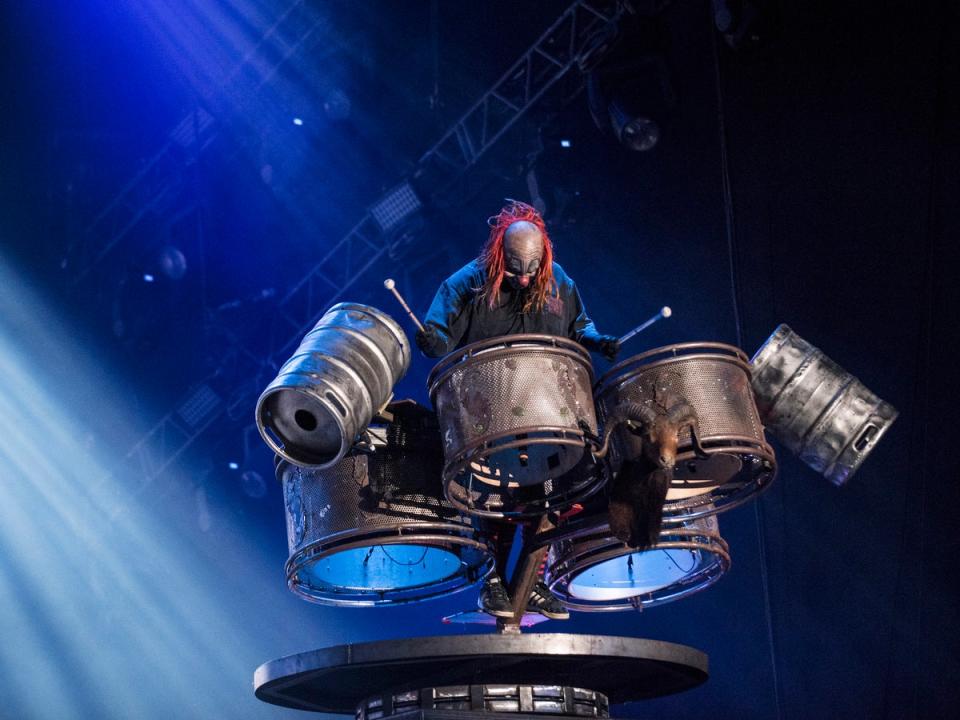
But like all things Slipknot, there was intention behind the shock. Stunts like the dead crow stopped Crahan from just going through the motions, he explains. They let him be present – to “pay attention” – at every show for every fan. Otherwise, “it’s like driving to and from work every night; I slam on this part of the song, I do this on that part. And so you take suggestions like dead crows to get yourself out of this world and into another one. It opens corridors, walls, and hallways and doors that are locked to a human brain by society.” There were, “unfortunately, also chemicals”, which played a role. “As an artist, you go down all these wormholes to open up your mind.”
Now, on to the masks. Crahan – who was the one to think up the idea way back when – kindly indulges me. “I love it when people in your position are a little apologetic for questions that may rub people like us a little indifferently,” he says. My reward then is a thoughtful and quite poignant answer. “When I came up with it back in the day it was because there was no way I was going to show my emotions. I grew up reading Hip Trader, Circus, Rolling Stone and I tell you what, you would never see a bad picture of David Lee Roth. Ever. That guy, he always looked good – and you know what, I’m no David Lee Roth. I knew for a fact you were going to get a bad picture of me and I’m very shy. I knew that I was going to cry, I knew that I was going to scream. I knew my eyes were going to look out at people in the crowd and they might think maybe I hate them. So, for me, the best way to take myself out of it, and in that way help myself be in it, was bringing out the clown. To this day, the mask is still important to me. It’s still my life. I wouldn’t do what I do without it.”
As is custom for Slipknot, the release of The End So Far brings with it a wardrobe change: a new line-up of creepy masks. As always, Crahan’s one resembles a clown. Only this time, it’s made from shards of mirror. A bulbous red nose sits pretty in the centre like a Christmas bauble. Crahan calls it his “disco ball mask”. He conceptualised the idea with his fans in mind. “I want to shine like a star, and I want everybody to shine like a star,” he says.
Twenty-one years ago, Crahan put a mirror on the inside cover of Iowa. “I put it there so that when you look at the cover [of a dead goat’s head] and you want to judge it, you can’t because you see a mirror and you realise you’re already a part of it.” The idea behind his latest disco ball mask blooms from that same seed. “The shattered mirror is kind of funky but so are you; everybody is. It’s all these tiny little mirrors and, when you’re looking at me, you’ll see yourself. You know you’re there with me. When I’m being a shooting star, you’re shooting with me.”
‘The End So Far’ is released on 30 September through Roadrunner Records

 Yahoo Movies
Yahoo Movies 
